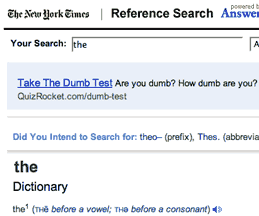Fresh from the "use the link" theme I started on Friday, I couldn't help being curious about the way things do and do not link from this New York Times story: "New Class(room) War: Teacher vs. Technology."
A few paragraphs below the very nice anecdotal lead (RU news writing students take note), comes this name-dropping sentence:
As that passage appears at nytimes.com, "Facebook" links to a business section page of Facebook stories, while Addictinggames goes to its own site, and eBay and YouTube are just text. Are humans involved in this linkage-making, or just scripts and robots? I suspect the fact that the author included the ".com" on the game site's name triggered an automated link, while the lack of ".com" on the names of the other sites' names rendered them simply names...
But I don't know why Facebook alone links to one of the company pages at nytimes.com, while eBay does not, even though it has such a page. I'm not a big reader of business news. Why no such page for YouTube? Probably because it's part of Rupert Murdoch's News Corp. empire.
 And, of course -- as a standard feature of Times pages -- accidentally double-clicking on any word brings up a "reference search" page after the system queries a database to define, for example, "the."
And, of course -- as a standard feature of Times pages -- accidentally double-clicking on any word brings up a "reference search" page after the system queries a database to define, for example, "the."
11:14:13 AM #
A few paragraphs below the very nice anecdotal lead (RU news writing students take note), comes this name-dropping sentence:
"The poor schoolmarm or master, required to provide a certain amount of value for your child's entertainment dollar, now must compete with texting, instant-messaging, Facebook, eBay, YouTube, Addictinggames.com and other poxes on pedagogy."
As that passage appears at nytimes.com, "Facebook" links to a business section page of Facebook stories, while Addictinggames goes to its own site, and eBay and YouTube are just text. Are humans involved in this linkage-making, or just scripts and robots? I suspect the fact that the author included the ".com" on the game site's name triggered an automated link, while the lack of ".com" on the names of the other sites' names rendered them simply names...
But I don't know why Facebook alone links to one of the company pages at nytimes.com, while eBay does not, even though it has such a page. I'm not a big reader of business news. Why no such page for YouTube? Probably because it's part of Rupert Murdoch's News Corp. empire.
 And, of course -- as a standard feature of Times pages -- accidentally double-clicking on any word brings up a "reference search" page after the system queries a database to define, for example, "the."
And, of course -- as a standard feature of Times pages -- accidentally double-clicking on any word brings up a "reference search" page after the system queries a database to define, for example, "the." When I did that, the fact that another Times link invited me to "Take The Dumb Test" was:
- ironic
- annoying
- insulting
- highly amusing
- an excuse to write this blog post
- all of the above
11:14:13 AM #
Copyright 2009 Bob Stepno
Theme Design by Bryan Bell